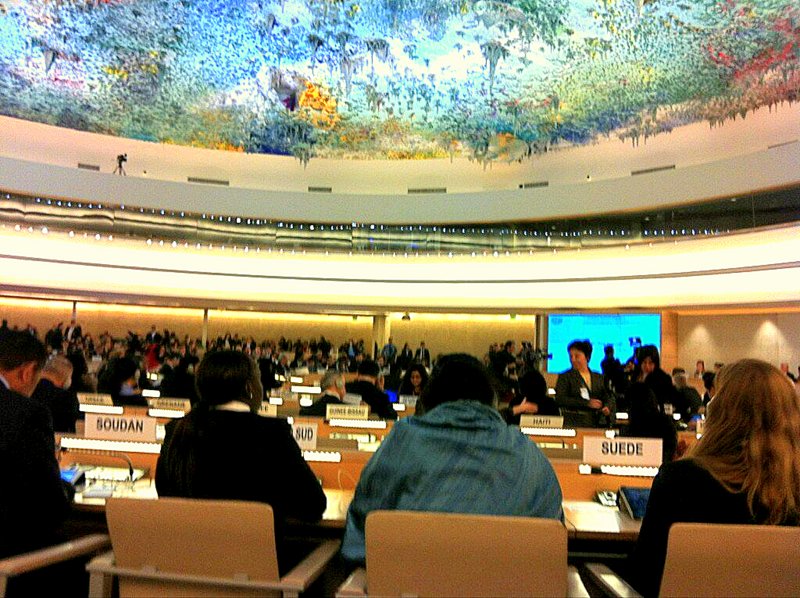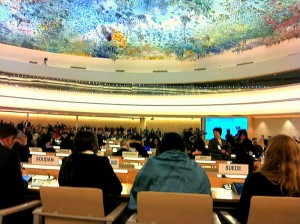Today, Monday, 27 May 2013, marks the beginning of the twenty-third session of the United Nations Human Rights Council (the Council) in Geneva. The session is scheduled to continue until 14 June 2013.
As part of the activities of this session, the Cairo Institute for Human Rights Studies (CIHRS) has submitted to the Council six written interventions in which it focuses on a number of key issues, including the right to freedom of assembly and peaceful protest, the right to freedom of association, and the right to freedom of opinion and expression. CIHRS also examines the legislation which governs these rights and freedoms in the Arab region in two written interventions to the Council; one focuses on the most prominent legal provisions which are used to limit the freedom of association in North Africa, and the other highlights the legislation related to freedom of expression in Egypt and Tunisia, emphasizing that despite the revolutions in these two countries, such laws continue to be used to silence voices critical of the current authorities.
CIHRS focuses in particular on Egypt and Syria in its written interventions to this session. One intervention is dedicated to the general state of human rights in Egypt in the past ten months and emphasized that many violations continue, including attacks on protestors, torture, military trials against civilians, and restrictions against free expression and media freedoms. In another written intervention to the Council, CIHRS reports on the state of media freedoms in Egypt in detail and records the most significant patterns of violations experienced by media professionals in Egypt, including legal harassment and prosecution as well as physical attacks during their coverage of protests. In addition, this intervention highlights the threats and inflammatory rhetoric used by various actors – including the president and the minister of information – against media professionals in Egypt.
CIHRS has also submitted two written interventions in cooperation with a number of Syrian and international rights organizations about the situation in Syria and the continuation of grave violations to human rights in the country, which have reached the level of war crimes and crimes against humanity. These crimes continue to be committed in an atmosphere of impunity for the perpetrators. One of these interventions on Syria focuses specifically on the effects of the current armed conflict on Syrian women and acknowledges the critical participation of women in the protest movement and the important role that they continue to play in organizing the activities of civil society in Syria, including the provision of humanitarian assistance to victims of the conflict and peace-building initiatives in their post-conflict communities.
CIHRS will also engage in this session of the Council through a number of oral interventions, which it will use to review the state of human rights in Egypt, the developments to the situation in Syria, and the human rights violations which continue to be committed in the occupied Palestinian territories, including the continued expansion of settlements.
During this session, CIHRS will organize a number of side events in Geneva to which diplomats and representatives from other regional and international NGOs will be invited. On 3 June, CIHRS will hold a side event to discuss the state of human rights in Egypt and the developments seen under the current regime. On 7 June, CIHRS will host another side event to focus on the situation in Syria and to urge the United Nations and to the international community to take urgent measures to end the armed conflict.
Women’s rights will also be highlighted by CIHRS at this session in the context of the annual day of discussion on women’s human rights held by the Council. In addition to the written intervention submitted about the human rights of women in the context of the armed conflict in Syria, CIHRS will be joined by a number of Egyptian women’s rights organizations in presenting an oral intervention discussing the most prominent violations to which women are subjected in Egypt.
The Human Rights Council is the principle body focused on human rights issues at the United Nations. Non-governmental organizations play a critical role in bringing the human rights situation in different countries to light and in confronting governments based on their violations of these rights. As such, the HRC provides such organizations with the opportunity to review rights conditions through a system of written and oral interventions. The Cairo institute for Human Rights Studies (CIHRS) is one of the organizations that take advantage of this opportunity to discuss a broad range of rights issues affecting the countries of the Arab world. Due to its consultative status at the United Nations, CIHRS is able to provide observations and testimonies about the situation of rights in the Arab region through its interventions and reports to the HRC.
The HRC holds three regular sessions per year to discuss human rights issues in various countries around the world, and it is made up of 47 member countries, which are elected from their regions for limited terms. The first session of the HRC was convened on June 19, 2006.
Attached are the written interventions submitted by the CIHRS to the 23rd session of the UN Human Rights Council.
Grave and ongoing violations of women_s rights in the context of the conflict in Syria
Freedom of Expression in Egypt and Tunisia
Freedom of Association in North Africa
Share this Post


